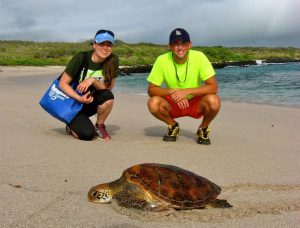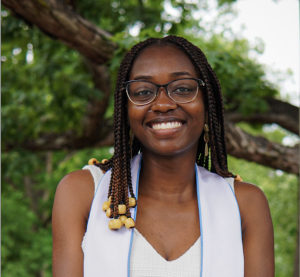Mingma Norbu Sherpa Community Engagement Fellowship
Overview
The annual Mingma Norbu Sherpa Community Engagement Fellowship provides $2,500 to graduate and professional students to support field study and engaged research in environmental areas at field sites.
 The fellowship is named for the late Mingma Norbu Sherpa, a pioneering conservationist in the Himalaya who served as an official with the World Wildlife Fund. A protégé of Sir Edmund Hillary, Mr. Sherpa believed that “saving nature need not take place at the expense of the people,” and as example of that, he developed an 800-square-mile conservation area surrounding the 28,169 foot tall Kangchenjunga (behind Everest and K2 in height). He and 23 others died in a 2006 helicopter crash just after they left a ceremony giving control of the area to the local residents. Carolina alumni Donald and Karen Wagoner, both Carolina M.B.A.s in the class of 1977, created this fellowship in his memory.
The fellowship is named for the late Mingma Norbu Sherpa, a pioneering conservationist in the Himalaya who served as an official with the World Wildlife Fund. A protégé of Sir Edmund Hillary, Mr. Sherpa believed that “saving nature need not take place at the expense of the people,” and as example of that, he developed an 800-square-mile conservation area surrounding the 28,169 foot tall Kangchenjunga (behind Everest and K2 in height). He and 23 others died in a 2006 helicopter crash just after they left a ceremony giving control of the area to the local residents. Carolina alumni Donald and Karen Wagoner, both Carolina M.B.A.s in the class of 1977, created this fellowship in his memory.
Application Guidelines
Recipients of the Mingma Norbu Sherpa Community Engagement Fellowship will be part of the larger Community Engagement Fellowship cohort and participate in cohort sessions. Interested students should apply through the Community Engagement Fellowship application process, indicating within their application the environmental focus of their proposal and their interest in being considered for the Sherpa Community Engagement Fellowship.
Applications open in November and close in February. Apply online through the CCPS Application and Nomination Portal.
2024 Sherpa Recipients
 Using photovoice to explore perceptions of water and sanitation in the AL Black Belt
Using photovoice to explore perceptions of water and sanitation in the AL Black Belt
Sherpa Community Engagement Fellowship
Student: Olivia Harmon
Area of study: Environmental Sciences and Engineering
Community partner: Emily McGlohn, Auburn University, Rural Studio
Faculty advisor: Joe Brown
Alabama’s Black Belt is characterized by a rich cultural heritage and as the birthplace of the Civil Rights movement in the United States. However, the region has recently gained national attention for failing or nonexistent wastewater infrastructure outside cities served by conventional sewerage leading to the Department of Justice’s first environmental justice investigation under Title VI of the Civil Rights Act of 1964. This investigation concluded with the citing of two areas of concern: the use of fines and law enforcement to punish people with inadequate wastewater treatment systems and inadequate action to assess and address health risks from raw sewage. In response to this sanitation crisis in the rural south, this research will examine the effects of an ongoing infrastructure project in Newbern, Alabama, located in the Black Belt region of Alabama. Specifically, this research is intended to assess the effects this sanitation intervention on environmental contamination, public health risk, and individual well-being. One way I will assess the intervention is through conducting a qualitative analysis via photovoice to capture residents’ perceptions of sanitation deficits prior to the installation of new sanitation infrastructure.
 Radical Placemaking: Reanimating Ewe Ecological and Cultural Memory
Radical Placemaking: Reanimating Ewe Ecological and Cultural Memory
Sherpa Community Engagement Fellowship
Students: Fowota Mortoo
Area of study: Geography
Community partner: ANO Institute of Arts and Knowledge, Nana Oforiatta Ayim
Faculty advisor: Chérie Rivers
Situated at the intersection of cultural heritage, ecology, and place-making, this research will examine how Ewe ecological practices can redress persisting colonial logics of extractivism in southern Ghana. The project consists of two major components: (1) creation of an audiovisual archive based on oral histories with small-holder farmers who employ indigenous Ewe agricultural practices and (2) an educational garden on a small tract of land that currently operates as a commercial pineapple farm.
Drawing upon Bissau-Guinean agronomist Amilcar Cabral’s work with the Experimental Farm of Pessubé, this project aims in a similar manner to transform material geographies in ways that recognize the interconnected nature of land, politics, economy, and culture. In collaboration with the ANO Institute of Research and Knowledge, an organization committed to reimagining food and education systems through the establishment of a farm and school in the mountains of Aburi, Ghana, this research will make a substantial contribution in broadening the geographic reach of the subfield of Black Geographies (whose scholarship is largely North American and Caribbean centric) while also contributing to community-grounded work that has significance beyond the boundaries of academia.
